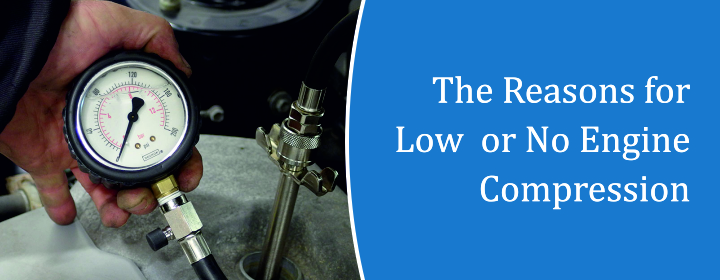
The Reasons for Low or No Engine Compression
Before we see the reasons that result in low or no compression in engine, it is important to know what engine compression is? In an internal combustion engine, compression is mainly the pressure generated within the combustion chamber when the mixture containing air and fuel gets compressed by the piston. This pressure is very important for the combustion that powers the engine. In case of insufficient compression, the engine is unable to generate required power supply. This blog will give you see all the reasons for it, as if this goes unnoticed with time it can lead to engine failure. In such cases going for a used engine from a trusted source like carenginepart.com can come as a reliable option, that ensure both quality and reliability in long run.
Low compression in engine
Low compression in engine indicated that the pressure is reduced in one or more cylinders. While dealing with this there can be many issues that can be causing this fault and are going unnoticed by the driver. Some most frequent causes are listed below:
Worn out piston rings
Piston rings act as a seal between the piston and cylinder walls that prevent leakage of gas. With time and continuous use these rings can worn out, which leads to leakage of gas during the compression stroke. This leakage results in dropping the compression levels.
Damage of cylindrical walls
If the cylindrical walls are scratched, scored, or warped then piston rings won’t be able to create a tight seal that results in loss of compression. This mainly happens due to overheating, insufficient lubrication and due to debris inside the engine.
Failure of head gasket
If the head gasket fails due to any reason, it will allow air and fuel to escape between the cylinder and engine block, resulting in low compression in the engine cylinder. Sometimes it also allows coolant and oil mixing with the combustion gases. If you notice white exhaust smoke or overheating of the engine don’t ignore that as they are the common symptom of head gasket failure.
Leaked or burned valves
Each cylinder has an intake valve and exhaust valve. These valves help to seal the gases, if due to any reason they become wrapped or burned, they won’t be able to seal properly. So during the compression stroke there are chances of compression loss.
No compression in engine
No compression refers to the total shortage of compression supply in the cylinders, resulting in total stoppage of functions in those cylinders. Below are the primary causes listed that are seen in such cases:
Timing belt or chain breakage
If the timing belt or chain fails, the camshaft will stop rotating; this ultimately stops the intake and exhaust valves from opening and closing. As a result of this disruption, the air-fuel mixture cannot compress properly. This leads to no compression in the engine cylinder.
Hole in piston
If due to any reason, a crack or puncture is there on the piston it will create a direct path for air and fuel mixture to escape those results in no compression. This will also lead to knocking or entering of unfamiliar objects into the combustion chamber.
Severely failed head gasket
A minor leak in the head gasket causes only low compression. However, a severely blown gasket can result in complete loss of compression in the engine. Especially in the case where multiple cylinders are affected and gasket fails between two adjacent cylinders.
Symptoms for compression problems
Below are some of the most common issues listed that you can consider to avoid severe problem:
- Difficulty in starting the engine
- Difficulty in acceleration
- Engine misfires
- Efficiency of fuel in decreased
- White or blue exhaust smoke
How to fix compression problems
Fixing of issue related are completely dependent on the cause and severity of the issue:
- Minor problems, such as worn-out piston rings or gasket issues, can be fixed by replacing them with new parts.
- Serious issues like cracked prison or heavily wrapped cylinder head, that are non repairable in such cases engine replacement is required.
Quick tip
Keep in mind that regular maintenance, such as changing the oil and using quality oil, can help prevent compression-related issues in your vehicle.
Conclusion
Whether your vehicle has low compression or no compression in the engine, both are serious issues. If they are not detected in time, they can lead to engine failure.
By following the tips above, you can easily spot the symptoms. However, if your engine does fail, you can consider used engines from carenginepart.com. These engines are compatible with almost every make and model.
We also provide warranty up to 90 days.

